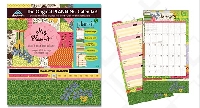When should children start using calendar planners
By Catalogs Editorial Staff

Need organization? Exactly when should children start using calendar planners?
Everyone, even kids, needs to be organized. A calendar planner is an efficient way to organize ones life. So when should children start using a calendar planner? The sooner the better. A parent can introduce her child to this organizational tool early on in life, even before the child can read if the planner is illustrated and colorful and captures the attention of the child.
Now do not expect a two year old to remember that the car payment is due on the 15th, but you can introduce your child to the days of the week and what activities, such as going to church, are associated with what days. This is also a good way to teach your child how to count: There are seven days in a week and 30 or 31 days in a month. The calendar or an organizational planner is an excellent teaching tool.
Ideally, by the time a child goes to school, he has learned some organizational skills because without them, he is going to struggle to keep up and get his assignments done on time. Most of us have been there, frantically sorting through a terribly messy book bag, trying to find that letter that he was supposed to bring home on Monday or attempting to retrieve that elusive sheet of paper with the spelling words on it.
Anything that you can do to help your child organize his life will be to his benefit as well as to yours.
Show your pre-school child a family photo calendar with pictures of his family or pets and explain to him the days of the week. Tell him that mommy goes to yoga class on Mondays and daddy plays basketball on Wednesdays, and that he goes to pre-school on Thursdays. Using colorful stickers to mark certain days will hold your child’s attention. Let him put a school bus sticker on Thursdays, the day he goes to pre-school or a sticker of a basketball player on the day dad plays ball.
It will not be until the child is older that he actually gets the knack of using a day planner or school planner but the earlier you introduce him to this concept the better. He will get the hang of it in no time flat and will not realize that he is actually learning a skill and becoming organized.
Another way to get your child interested in using a day planner is to point out memorable occasions, such as birthdays and holidays and mark this in the planner. Again, you can use a sticker or a marker to write in names. When the child gets into school and can read and write he can write down these things, as well as home work assignments and school events and activities, himself.
Let your child pick out her own planner. If she loves dogs, she is likely to pick one that has a dog theme. The selection process is going to be fun. There are so many calendar planners available that it will probably be difficult for your child, and you, to narrow it down to just one.
Pick one that is big enough to accommodate your hectic schedule and the activities that you have to keep track of. If you have a lot of stuff to write down, do not pick a tiny calendar planner. If your child has large handwriting make sure he selects one that provides enough room to write in.
Show your child your calendar or planner and how you use it. She may emulate your style or create one of her own. What works for you may not work for her.
~
In addition to having personal calendars, which the parent should carry in her purse or briefcase, and the child should keep in his book bag, put a big master family calendar up in a very visible space in your home. Tell your kids to check the master calendar every day to make sure their schedule is jiving with it and there are not going to be any major foul-ups and scheduling conflicts.
When children use a personal planner, a photo calendar or an online calendar, it’s not only fun, but it gives them a sense of being in control of their lives. It teaches them responsibility as well as organizational skills. Their teacher will thank you.
Resources:
Teach kids how to use a planner











